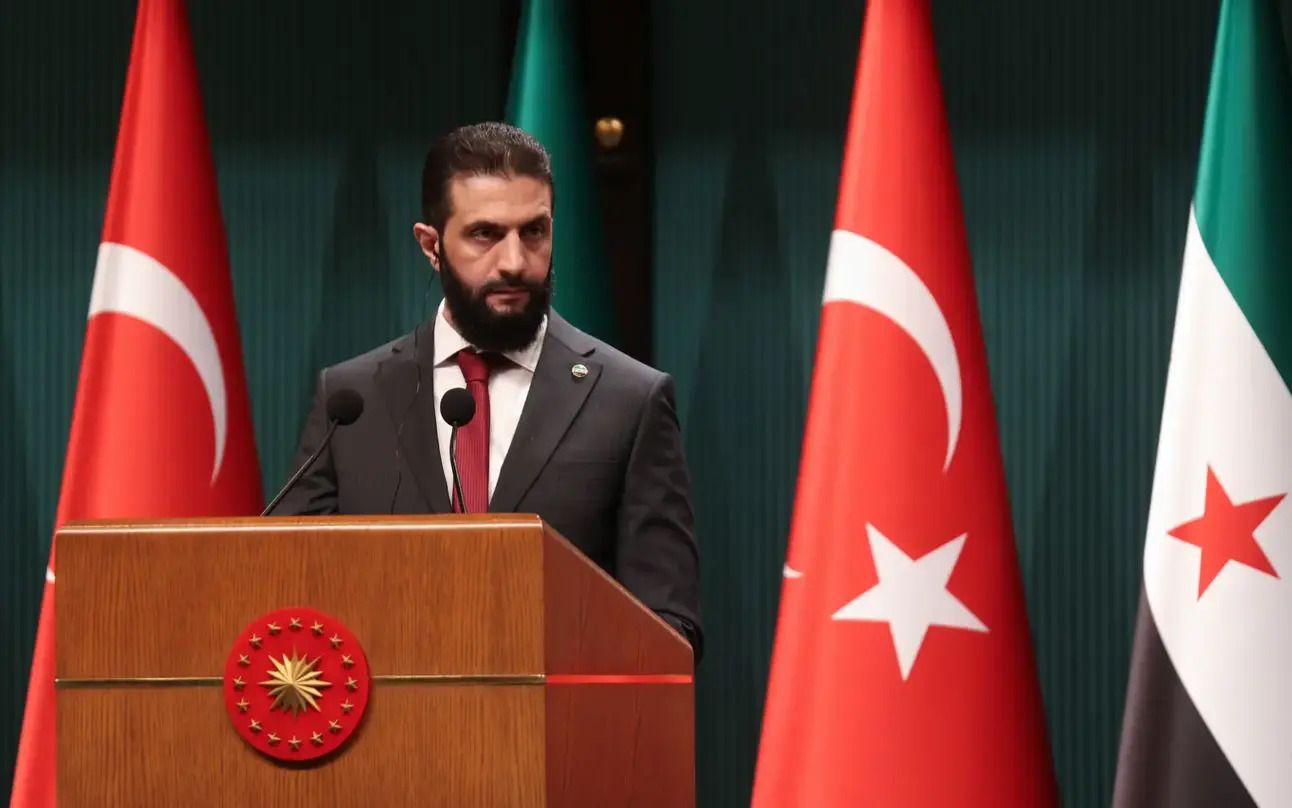- Stratagem
- Posts
- 🌎BBB Weekly Edition #4🌎
🌎BBB Weekly Edition #4🌎
📝Why Syria’s President Changed His Name, The Trump Administration Levied Sanctions on Iranian Oil, and U.S. Tariffs Caused Regional Interdependency Agreements📌


Syrian interim President Ahmed al-Sharaa attends a press conference in Ankara, Turkey, in Feb 2025.
🚨What We’re Watching🎥
📍From al-Sharaa to al-Jolani to al-Sharaa: A Fight for Post-Assad Syria
📚Facts: The current interim President of Syria changed his name back to Ahmed Hussein al-Sharaa after spending most of his life using the nom de guerre Abu Mohammad al-Jolani. Al-Sharaa joined al-Qaeda in 2003, adopting the name al-Jolani to symbolize his new ideology encompassing both Jihadist and nationalist struggles for Syria’s territorial integrity. However, in 2016, he severed ties with al-Qaeda to form Hay’at Tahrir al-Sham (HTS), the group that overthrew the al-Assad regime in December. “Al-Jolani” translated from Arabic means “the one from the Golan” which refers to al-Sharaa’s father who grew up in Golan and the fact that Ahmed has spent his whole life displaced due to the conflict. Israel seized the Golan Heights in the 1967 Six-Day War, along with the Sinai Peninsula, Gaza Strip, West Bank, and East Jerusalem.
💭Analysis: Al-Sharaa’s rise to power prompted an Israeli policy shift towards the Golan Heights. Israel continues expanding its presence in the zone with new military bases and infrastructure. The 1974 agreement established the buffer zone, which Israeli Prime Minister Netanyahu cited as invalid due to the change of Syrian regime while Al-Sharaa has sought to uphold the agreement and prioritize reconstruction and stability. The Israelis see the territorial occupation as necessary due to the changing political state of Syria, while also fostering a relationship with the Druze ethnic group who live near Golan. The shift in the Golan Heights further complicates al-Sharaa’s leadership as he navigates the balance of addressing Syrian sovereignty amidst external pressure from both Israel and the international community.
📍E.U. Special Designation Requested to Quicken Black Sea Powerline Construction
📚Facts: Azerbaijan, Georgia, Hungary, and Romania have planned the construction of an electricity cable linking Azerbaijan’s Caspian wind farms through Georgia and under the Black Sea to E.U. member states. They requested the Project of Mutual Interest (PMI) designation to receive funding, heighten investment visibility, and speed along planning and permit approvals for the cable on March 10. Currently, the majority of Hungarian and Romanian gas comes from Russia. After the Russian invasion of Ukraine in 2022, E.U. member states recognized the need to wean off of Russian energy. The cable project launched in September 2024 to help decouple from Russia, achieve lower electricity prices, and speed up the transition to green energy.
💭Analysis: The Caucasus nations are developing interdependencies with E.U. member states, and as more states shift away from Russian energy, Russian energy prices will rise. The International Energy Agency says Russian crude oil prices have fallen in response to rising transport costs due to American, E.U., and UK sanctions. Last month, the Baltic States of Estonia, Latvia, and Lithuania switched from Russia’s power grid to the E.U. energy grid. Azerbaijan is working with Kazakhstan and Uzbekistan on a potential Caspian Sea power line to bring more green electricity to the E.U. The combination of higher Russian costs and growing Caucus-E.U. relations could lead to Russian efforts to exert more power over the Caucuses with their geographic leverage.
📍U.S. Sanctions Iranian Oil Ministry and Shadow Fleet, Targeting Nuclear Proliferation
📚Facts: The Department of State issued sanctions on Iran in conjunction with Trump’s “maximum pressure strategy” on March 13, 2025, targeting Iran’s Oil Minister and shadow fleet; a fleet of vessels used to evade sanctions through evasive and concealing tactics. The sanctions are designed to impair Iran’s nuclear capabilities and ballistic missile program development by decreasing access to oil revenue. Iran’s oil exports “accounted for more than 40%” of its export revenue in 2023. Iranian leader Ali Khamenei rejected a negotiation letter sent by President Trump.
💭Analysis: Trump tactically leveraged sanctions to pressure Iran to negotiate its nuclear capabilities. Previous sanctions in Trump’s first administration crippled Iran’s crude oil exports. Iran is motivated to obtain nuclear weapons. Iran reneged on the 1970 Nuclear Nonproliferation Treaty and 2015 Joint Comprehensive Plan of Action, which was tasked with halting its nuclear program development. Iran’s acquisition of nuclear weapons would drastically increase its influence both in the Middle East and globally.
📍Indonesia and Vietnam Strengthen Ties Amidst Rising U.S. Tariff Threats
📚Facts: On March 10th, the Indonesian and Vietnamese governments agreed to promote their diplomatic relationship to a comprehensive strategic partnership. The new partnership enhances collaboration in trade, security, green energy, and education. The countries will decrease barriers to free trade and investment and enhance their defense integration. The Trump administration has threatened to increase tariffs on both countries in recent months. Vietnam’s large trade surplus with the U.S. grew 20% in 2024, reaching a record $123 billion. Indonesia’s U.S. trade surplus grew by 5.4% in 2024, totaling $17.9 billion. Trump has repeatedly criticized U.S. trade deficits and vowed to “correct” such imbalances. Vietnam is likely to be significantly affected by these tariffs, given its high export-to-GDP ratio. Indonesia has expressed its intent to diversify its markets and strengthen economic ties with other partners in response to tariff threats from the United States.
💭Analysis: The Trump administration's threats to enact tariffs against Southeast Asian nations have intensified trade tensions with countries in the region. The strategic development helps Vietnam and Indonesia mitigate their vulnerability to potential U.S. tariffs by enhancing bilateral trade and investment, reducing their economic reliance on American export markets. The alignment of their defense and security interests could help both countries navigate pressure from the US-China power competition. A stronger Indonesia-Vietnam bloc could signal their intent to assert greater regional autonomy, reducing their economic and security reliance on the US and China.
👀Looking Ahead👀
📍EU and South Africa Strengthen Ties and Shift Away from U.S. Influence
📚Facts: On March 12, the European Union and South Africa held their first bilateral summit in seven years. The EU announced the Global Gateway Investment Package, a $5.1 billion package that supports South Africa’s green energy development and vaccine production. The parties also agreed to begin new trade negotiations focused on the clean energy transition. South Africa is the EU’s only African partner and its largest trading partner in the region. European Commission President Ursula von der Leyen emphasized the importance of cooperation, stating that “South Africa can count on Europe. And I know Europe can count on South Africa.”
💭Analysis: Von der Leyen’s message of international cooperation counters Trump’s trade protectionist and isolationist messaging. Trump has recently strained E.U.-U.S. relations, threatening tariffs and sideling the bloc from key negotiations on the Russia-Ukraine war. The U.S. has also withdrawn funding and support from other green energy investments. Subsequently, the EU is increasingly doubting the reliability of the US as an economic and defense partner, looking for alternative nations for partnerships. As the U.S. continues to retreat from global politics, they risk the E.U. and other allies filling their absence by strengthening alternative partnerships, such as the deal with South Africa.

💡The TSI Insider💡
TSI members are looking forward to diving beyond the front page headlines this Wednesday during our event on the Russo-Ukrainian War. We will be gaining insider perspectives on the conflict in Ukraine from three distinguished speakers: Dr. Lise Howard, Alexandra Sharp, and Lieutenant Colonel Joshua Wiles. Looking for an invitation to the conversation? Please complete this google form! Many thanks to the TSI event team for organizing this event, we are excited to see everyone there!
🍀One For The Road🍀
TSI wishes everyone good luck and fortune in honor of St. Patrick’s Day yesterday! TSI members celebrated on Saturday in style with fresh green outfits, great friends, and festivities.
Not a subscriber? Click here to subscribe!
See You On Thursday For 🌊The Deep Dive!🌊
This week’s newsletter brought to you by the Beyond Borders Brief staff. Connect with us on social media to pose questions, comments, or feedback. Click here to learn more about TSI.
Reply